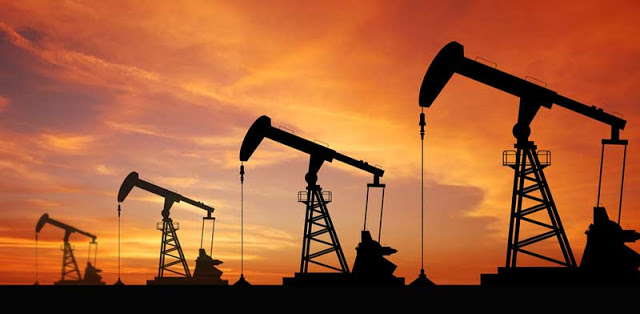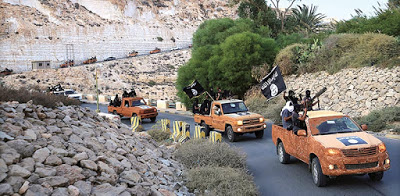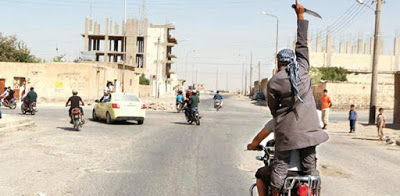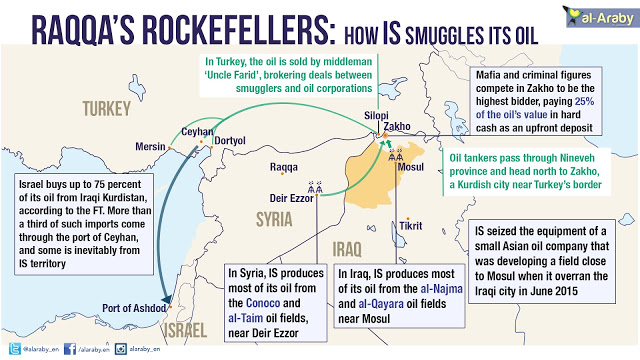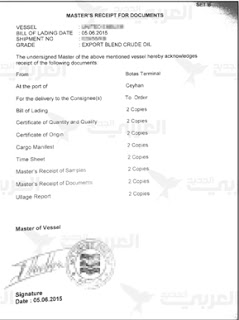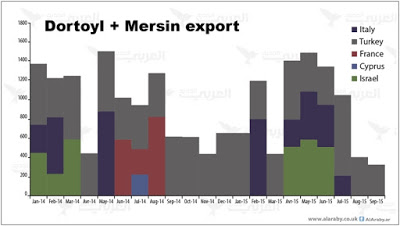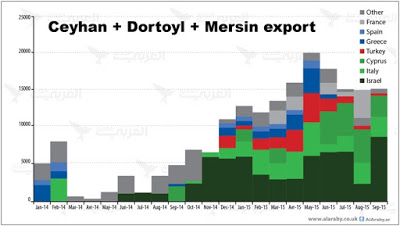seems a solution has been found to the Labour Party Shadow Cabinet’s problem. Clearly a majority want to do join the French and do some bombing. The question is where? Up till now they
have fixated on bombing the people of Raqqa. But it would be more logical to bomb those who finance and supply ISIS.
courtesy of Globes, Israel business news – that those who are
financing Isis, as many of us suspected, are based in Israel. It is Netanyahu and the terrorist State of
Israel which is financing Isis through its purchase of Isis’s stolen oil.
has been found to satisfy both anti-imperialists and New Labours’ bomb ‘em brigade. Let’s bomb Tel Aviv and the Knesset (we’ll give them one minute as they did in Gaza!).
and Turkish smugglers are transporting oil from ISIS controlled territory in
Syria and Iraq and selling it to Israel, according to several reports in the
Arab and Russian media. An estimated 20,000-40,000 barrels of oil are produced
daily in ISIS controlled territory generating $1-1.5 million daily profit for
the terrorist organization.
oil is extracted from Dir A-Zur in Syria and two fields in Iraq and transported
to the Kurdish city of Zakhu in a triangle of land near the borders of Syria,
Iraq and Turkey. Israeli and Turkish mediators come to the city and when prices
are agreed, the oil is smuggled to the Turkish city of Silop marked as
originating from Kurdish regions of Iraq and sold for $15-18 per barrel (WTI
and Brent Crude currently sell for $41 and $45 per barrel) to the Israeli
mediator, a man in his 50s with dual Greek-Israeli citizenship known as Dr.
Farid. He transports the oil via several Turkish ports and then onto other
ports, with Israel among the main destinations.
August, the “Financial Times” reported that Israel obtained 75% of
its oil supplies from Iraqi Kurdistan. More than a third of such exports go
through the port of Ceyhan, which the FT describe as a “potential gateway for ISIS-smuggled crude.”
one way or another become the main marketer of ISIS oil. Without them, most
ISIS-produced oil would have remained going between Iraq, Syria and Turkey.
Even the three companies would not receive the oil if they did not have a buyer
in Israel,” an industry official told the newspaper
“al-Araby al-Jadeed.”
marketer of IS oil. Without them, most ISIS-produced oil would have remained
going between Iraq, Syria and Turkey,”
the industry official added.
©
Copyright of Globes Publisher Itonut (1983) Ltd. 2015
The “ISIS Rockefellers”: How Islamic State Oil Flows to Israel
November 27, 2015
Editor’s Note: Some of the details of this report are fully
corroborated.
produced by the Islamic State group finances its bloodlust. But how is it
extracted, transported and sold? Who is buying it, and how does it reach
Israel?
produced from fields under the control of the Islamic State group is at the
heart of a new investigation by al-Araby al-Jadeed. The black gold is
extracted, transported and sold, providing the armed group with a vital
financial lifeline.
who buys it? Who finances the murderous brutality that has taken over swathes
of Iraq and Syria? How does it get from the ground to the petrol tank, and who
profits along the way?
Islamic State group uses millions of dollars in oil revenues to expand and
manage vast areas under its control, home to around five million civilians.
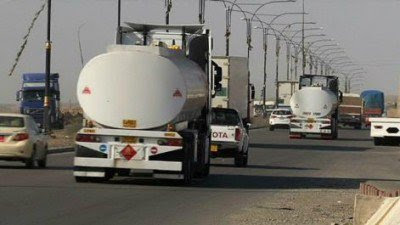 |
| The Islamic State group’s oil earns the ‘caliphate’ $19 million a month through international markets [source: al-Araby] |
sells Iraqi and Syrian oil for a very low price to Kurdish and Turkish
smuggling networks and mafias, who label it and sell it on as barrels from the
Kurdistan Regional Government.
is then most frequently transported from Turkey to Israel, via knowing or
unknowing middlemen, according to al-Araby’s investigation.
Islamic State group has told al-Araby that it did not intentionally sell oil to
Israel, blaming agents along the route to international markets.
Oil fields
All around IS-controlled oil fields in northern Iraq and eastern Syria, there
are signs that read: “Photography is strictly forbidden – violators risk their
safety.” They have been signed in the name of the IS group.
oil fields are in production between seven and nine hours a day, from sunset to
sunrise, while production is mostly supervised by the Iraqi workers and
engineers who had previously been running operations, kept on in their jobs by
IS after it captured the territory.
is heavily dependent on its oil revenues. Its other income, such as from
donations and kidnap ransoms has slowly dwindled. Workers in IS oil fields and
their families are well looked after, because they are very important to the
group’s financial survival.
oil extraction capacity developed further in 2015 when it obtained hydraulic
machines and electric pumps after taking control of the Allas and Ajeel oil
fields near the Iraqi city of Tikrit.
group also seized the equipment of a small Asian oil company that was
developing an oil field close to the Iraqi city of Mosul before IS overran the
area last June.
oil production in Syria is focused on the Conoco and al-Taim oil fields, west
and northwest of Deir Ezzor, while in Iraq the group uses al-Najma and al-Qayara
fields near Mosul. A number of smaller fields in both Iraq and Syria are used
by the group for local energy needs.
to estimates based on the number of oil tankers that leave Iraq, in addition to
al-Araby‘s sources in the Turkish town of Sirnak on the border with
Iraq, through which smuggled oil transits, IS is producing an average of 30,000
barrels a day from the Iraqi and Syrian oil fields it controls.
The export trek
Al-Araby has obtained information about how IS smuggles oil from a colonel
in the Iraqi Intelligence Services who we are keeping anonymous for his
security.
information was verified by Kurdish security officials, employees at the
Ibrahim Khalil border crossing between Turkey and Iraqi Kurdistan, and an
official at one of three oil companies that deal in IS-smuggled oil.
Iraqi colonel, who along with US investigators is working on a way to stop
terrorist finance streams, told al-Araby about the stages that the
smuggled oil goes through from the points of extraction in Iraqi oil fields to
its destination – notably including the port of Ashdod, Israel.
the oil is extracted and loaded, the oil tankers leave Nineveh province and
head north to the city of Zakho, 88km north of Mosul,” the colonel said. Zakho
is a Kurdish city in Iraqi Kurdistan, right on the border with Turkey.
IS oil lorries arrive in Zakho – normally 70 to 100 of them at a time – they
are met by oil smuggling mafias, a mix of Syrian and Iraqi Kurds, in addition
to some Turks and Iranians,” the colonel continued.
person in charge of the oil shipment sells the oil to the highest bidder,” the
colonel added. Competition between organised gangs has reached fever pitch, and
the assassination of mafia leaders has become commonplace.
highest bidder pays between 10 and 25 percent of the oil’s value in cash – US
dollars – and the remainder is paid later, according to the colonel.
drivers hand over their vehicles to other drivers who carry permits and papers
to cross the border into Turkey with the shipment, the Iraqi intelligence
officer said. The original drivers are given empty lorries to drive back to
IS-controlled areas.
to the colonel, these transactions usually take place in a variety of locations
on the outskirts of Zakho. The locations are agreed by phone.
crossing any borders, the mafias transfer the crude oil to privately owned
rudimentary refineries, where the oil is heated and again loaded onto lorries
to transfer them across the Ibrahim Khalil border crossing into Turkey.
rudimentary refining, according to the colonel, is performed because Turkish
authorities do not allow crude oil to cross the border if it is not licensed by
the Iraqi government.
initial refining stage is conducted to obtain documents that would pass the oil
off as oil by-products, which are allowed through the border.
to the intelligence officer, border officials receive large bribes from local
Iraqi smuggling gangs and privately owned refineries.
in Turkey, the lorries continue to the town of Silopi, where the oil is
delivered to a person who goes by the aliases of Dr Farid, Hajji Farid and
Uncle Farid.
Farid is an Israeli-Greek dual national in his fifties. He is usually
accompanied by two strong-built men in a black Jeep Cherokee. Because of the
risk involved in taking a photo of Uncle Farid, a representative drawing was
made of him.
inside Turkey, IS oil is indistinguishable from oil sold by the Kurdistan Regional
Government, as both are sold as “illegal”, “source unknown” or “unlicensed”
oil.
companies that buy the KRG oil also buy IS-smuggled oil, according to the
colonel.
route to Israel
paying drivers, middlemen and bribes, IS’ profit is $15 to $18 a barrel. The
group currently makes $19 million on average each month, according to the
intelligence officer.
Farid owns a licensed import-export business that he uses to broker deals
between the smuggling mafias that buy IS oil and the three oil companies that
export the oil to Israel.
illegal trades. One of these companies is also supported by a very high-profile
Western official.
companies compete to buy the smuggled oil and then transfer it to Israel
through the Turkish ports of Mersin, Dortyol and Ceyhan, according to the
colonel.
business as Uncle Farid – but he remains the most influential and effective
broker when it comes to marketing smuggled oil.
Dr Alec D Coutroubis at the University of Greenwich tracked the oil trade
through Ceyhan port, and found some correlation between IS military successes
and spikes in the oil output at the port.
August, the Financial Times reported that Israel obtained up to 75
percent of its oil supplies from Iraqi Kurdistan. More than a third of such
exports go through the port of Ceyhan, which the FT authors describe as a
“potential gateway for IS-smuggled crude”.
told al-Araby al-Jadeed that this suggests corruption by middlemen and
those at the lower end of the trade hierarchy – rather than institutional abuse
by multinational businesses or governments.
to a European official at an international oil company who met with al-Araby
in a Gulf capital, Israel refines the oil only “once or twice” because it does
not have advanced refineries. It exports the oil to Mediterranean countries –
where the oil “gains a semi-legitimate status” – for $30 to $35 a barrel.
oil is sold within a day or two to a number of private companies, while the
majority goes to an Italian refinery owned by one of the largest shareholders
in an Italian football club [name removed] where the oil is refined and used
locally,” added the European oil official.
has in one way or another become the main marketer of IS oil. Without them,
most IS-produced oil would have remained going between Iraq, Syria and Turkey.
Even the three companies would not receive the oil if they did not have a buyer
in Israel,” said the industry official.
to him, most countries avoid dealing in this type of smuggled oil, despite its
alluring price, due to legal implications and the war against the Islamic State
group.
Delivery and payment
Al-Araby has discovered that IS uses a variety of ways to receive payments
for its smuggled oil – in a manner similar to other international criminal
networks.
IS receives a cash payment worth 10 to 25 percent of the oil’s value upon sale
to the criminal gangs operating around the Turkish border.
payments from oil trading companies are deposited in a private Turkish bank
account belonging to an anonymous Iraqi person, through someone such as Uncle
Farid, and then transferred to Mosul and Raqqa, laundered through a number of
currency exchange companies.
oil payments are used to buy cars that are exported to Iraq, where they are
sold by IS operatives in Baghdad and southern cities, and the funds transferred
internally to the IS treasury.
responds
before this investigation report was concluded, al-Araby was able to
talk via Skype to someone close to IS in the self-acclaimed capital of
the “caliphate,” Raqqa, in Syria.
be fair, the [IS] organisation sells oil from caliphate territories but does
not aim to sell it to Israel or any other country,” he said. “It produces and
sells it via mediators, then companies, who decide whom to sell it to.”
See more at: http://www.alaraby.co.uk/english/features/2015/11/26/raqqas-rockefellers-how-islamic-state-oil-flows-to-israel/#sthash.CeUfsSCe.dpuf
of this article is Al-‘Arabi Al-Jadeed
